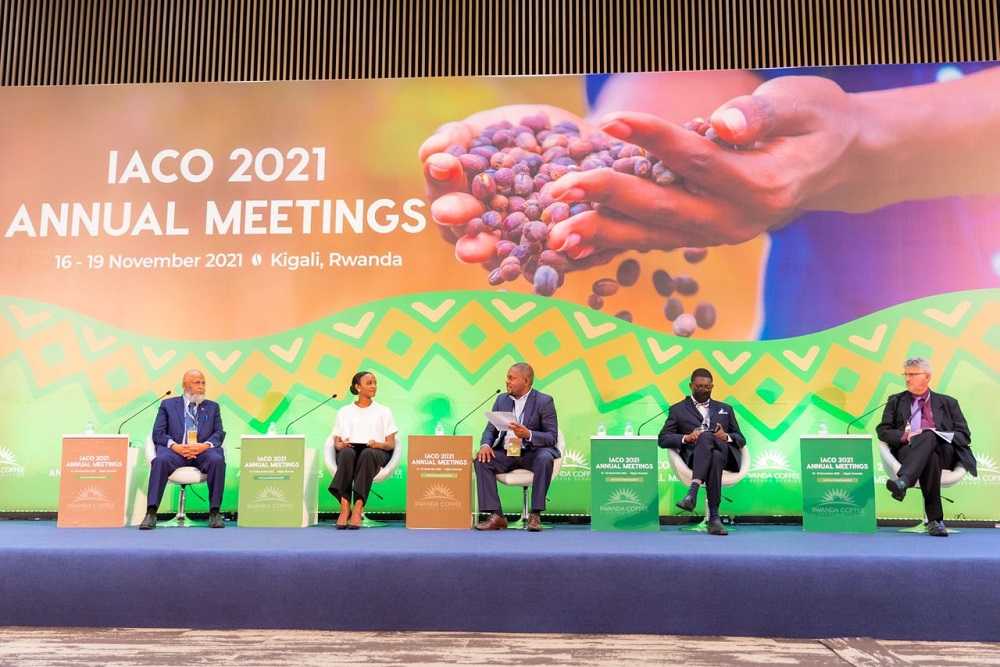KIGALI, Rwanda – CABI has participated in the 61st IACO 2021 Annual Meeting in Kigali, Rwanda, aimed at showcasing the important role coffee plays in the socio-economic development of 25 African coffee producing nations spanning the continent.
Dr Morris Akiri, Senior Regional Director, CABI Africa, moderated a high-level panel discussion drawing upon the overarching theme of the 9th African Coffee Symposium ‘Strengthening the coffee value chain for sustainable development of the economy and improved living incomes of African producers.’
The panel – which focused on discussing ways to improve value-addition and promote the domestic consumption of African coffee – included Ms Raissa Ikuzwe, CEO and founder, INO Coffee Series, Dr Frederick Kawuma, African Coffee Ambassador from Uganda, Mr Amir Hamza, Chairman and CEO of Amir Hamza Limited, Tanzania and Mr Marcus R.G Brandalise, CEO, BrazAfric Enterprises Limited.
The panellists emphasised the need for enhanced domestic consumer awareness and the development of a coffee consumption culture across the continent. This would be hinged on the collaborative efforts of all stakeholders in the entire coffee value chain.
By setting up the right policy frameworks and financial structures, governments can make it easier for small and large businesses in the sector to thrive. Lowering production costs and giving incentives for value addition locally could give better returns with a ripple down effect to the millions of coffee farmers in the continent, consequently improving their livelihoods.
Trade agreements like African Continental Free Trade Area can help increase trade between coffee producing and coffee consuming countries across Africa.
Continuous innovation and technology will be critical, especially where consumers prefer high quality coffee products and place value on their consumption experience as seen in millennial consumers who prefer trendy, convenient and valuable experiences.
The event served as a platform for member states and relevant delegates to voice their concerns on the many issues threatening the coffee sector. The meeting also provided the Rwanda Coffee Industry with a unique opportunity to not only market its coffee but discuss and find different solutions to the important issues that coffee producers in Africa face.
The continent currently has approximately 12 million coffee farming households directly involved in coffee production -one of the highest globally. According to the International Coffee Organization (ICO), Ethiopia and Uganda produced 13.1 million coffee bags representing about 69.8% of the total production for the year 2020 to 2021. But even with these successes, the sector still faces some challenges.
For instance, back in September 2020, the issue of COVID-19 and the impact on Africa’s coffee sector was brought to the fore when the Inter African Coffee Organisation (IACO) joined forces with ICO and CABI, to design an emergency intervention programme to alleviate the impact of the pandemic.
The initiative, estimated to cost Euro 12 million, aims to alleviate market disruptions, food, nutrition and income security challenges facing millions of smallholder coffee farmers across 11 countries for an initial three-year period.
Other challenges highlighted in the event included weak farmer cooperatives that could not handle credit and inputs efficiently. This included limited access to credit and inputs such as extension services. Some of the proposed solutions included the call for stronger farmer organisations that could facilitate access to credit, inputs and extension services to coffee farmers.
The government on the other hand could provide technical and management support and collateral for commercial bank loans through facilities like credit guarantee funds.
Among the speakers at the 61st IACO 2021 Annual Meeting were His Excellency Hailemariam Dessalen, Former Prime Minister of Ethiopia, Her Excellency Ambassador Josefa Leonel Correia Sacko, a leading African agronomist and Commissioner for Agriculture, Rural Development, Blue Economy and Sustainable Environment of the African Union Commission and economist Nicholas Mudingwe.


















